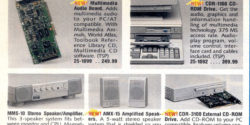A protocol for streaming audio on a computer network was first published 44 years ago. That’s likely a good two decades or more before you, or most people, even heard of the internet. In fact, streaming audio over what became the internet was in use – for academic conferencing purposes at least – over the following two decades.
Journalist Dom Robinson uncovers this little-known pre-history of internet radio in an article celebrating the 25th anniversary of the medium for Streaming Media. In order to keep things clear, Robinson defines internet radio as, “streaming, over IP, of content that is live, scheduled by the transmitter (not by the receiver), and ‘produced’—so not just a microphone and a lecture.” Or, with fewer words but more jargon: “a one-to-many scheduled live-linear programmed audio content stream delivered over IP and accessible from the internet.”
He traces the first qualifying broadcast to 1993, when technologist and public domain advocate Carl Malamud started a streaming audio channel called “Talk Radio” and his program, “Geek of the Week.” Now, this show wasn’t transmitted in the way we now get internet radio.
It used a technology called multicast, over a platform called Mbone, intended to stream audio and video across the internet in an efficient fashion. In simple terms, this meant the audio was streamed over participating networks, whether or not a listener had requested it. Sort of like cable TV, the show was just on, streaming across your network, and as a listener you could just tune in. The efficiency of it was that everyone could share the same stream, unlike modern internet radio where every listener gets their own data stream. This means that today, if there are five people on the same network listening to the same station, each gets their own stream, consuming five times the data compared to multicast, where everyone would share one.
However, for multicast and Mbone to work, individual networks have to participate, and choose to have all this data stream over their networks. In most cases, this network would be your ISP, like Comcast or AT&T. Since there’s not much in it for them – except a lot of extra data to carry – it never caught on. But back in the early 1990s, when it was mostly universities and research institutions on the internet, and home connections were rare, the Mbone had more penetration, in part because bandwidth was also much more limited than today.
Moreover, computers didn’t necessarily come standard with microphones and speakers, and even MP3 hadn’t been invented yet. So, you can imagine just how small the number of potential broadcasters and listeners was.
Nevertheless, 25 years ago it represented the dawn of internet radio.
Another important side note is that “Geek of the Week” helped to save podcasting from the so-called “podcast patent troll.” You see, the validity of this patent for podcasting – first filed in 1996 for a cassette-based technology and later amended to cover computer audio files in 2012 – depended upon it being original, and there being no “prior art.” That is, in order for the patent to be valid, it had to be the case that nothing quite like podcasting, or episodic internet radio, had to exist before the patent was filed.
Turns out, not only was “Geek of the Week” likely the first regularly scheduled internet radio broadcast, because the show was also archived online, it was also one of the first documentable podcasts, existing three years before the original “podcast” patent was filed. The Electronic Frontier Foundation and other groups used this fact to convince the US Patent Office to invalidate this patent, saving podcasters from the potential nightmare of perpetual extortionate royalty payments just to put audio online.
The story of “Geek of the Week” is just one in Robinson’s fascinating article. And part two, which includes the birth of RealAudio, is still on the way.
He’ll also be joining me on next week’s Radio Survivor show and podcast to help spread this important, but little-known history.



